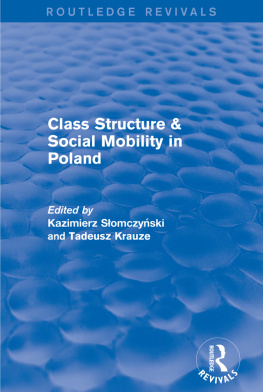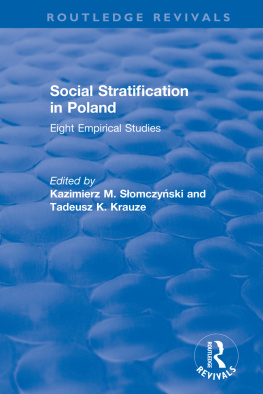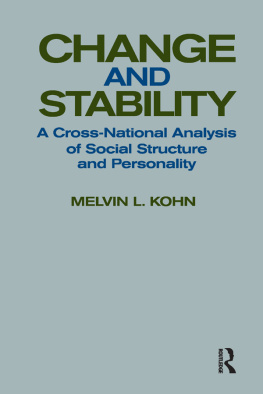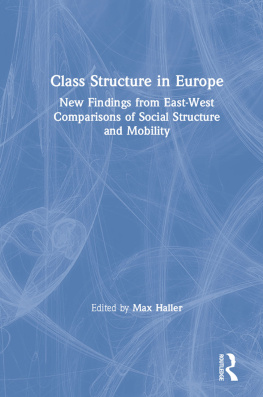First published 1978 by M.E. Sharpe
Reissued 2018 by Routledge
2 Park Square, Milton Park, Abingdon, Oxon OX14 4RN
711 Third Avenue, New York, NY 10017, USA
Routledge is an imprint of the Taylor & Francis Group, an informa business
Copyright 1978 by Taylor & Francis
Translated by Anna M. Furdyna.
Published simultaneously as Vol. VII, no. 3-4 of International Journal of Sociology
No part of this book may be reprinted or reproduced or utilised in any form or by any electronic, mechanical, or other means, now known or hereafter invented, including photocopying and recording, or in any information storage or retrieval system, without permission in writing from the publishers.
Notices
No responsibility is assumed by the publisher for any injury and/or damage to persons or property as a matter of products liability, negligence or otherwise, or from any use of operation of any methods, products, instructions or ideas contained in the material herein.
Practitioners and researchers must always rely on their own experience and knowledge in evaluating and using any information, methods, compounds, or experiments described herein. In using such information or methods they should be mindful of their own safety and the safety of others, including parties for whom they have a professional responsibility.
Product or corporate names may be trademarks or registered trademarks, and are used only for identification and explanation without intent to infringe.
Publisher's Note
The publisher has gone to great lengths to ensure the quality of this reprint but points out that some imperfections in the original copies may be apparent.
Disclaimer
The publisher has made every effort to trace copyright holders and welcomes correspondence from those they have been unable to contact.
A Library of Congress record exists under LC control number: 78056273
ISBN 13: 978-0-873-32120-4 (hbk)
ISBN 13: 978-1-315-17785-4 (ebk)
How far have sociologists working in countries commonly designated as "socialist" gone in studying the class structure and social consciousness of their own societies? What kinds of questions have they posed, and what is the degree of technical sophistication applied in answering them? Western sociologists interested in the fate of their discipline in Eastern Europe and the Soviet Union have long recognized that the answers to these questions will differ substantially depending upon which particular socialist society one has in mind. They would also probably agree that throughout most of the postwar period Polish sociology in terms of the range of its interests and its general scientific stature has had few, if any, rivals among the socialist countries. Indeed, it has served as an important catalyst for the legitimation and development of sociology as a distinct social science discipline in other socialist countries, including the Soviet Union.
But it would be an injustice to Polish sociologists to regard the significance of their work solely from the standpoint of its "leading role" among socialist countries. Polish sociologists would undoubtedly want their work appraised in a broader context, and with some justification. One reason for this is suggested by the report of a Western scholar who has followed the development of sociology in Eastern Europe: "In stratification, political sociology, and rural sociology Poland is probably ahead of a number of West European countries" (Bogdan Denitch in Slavic Review , June 1971, p. 233). Whether all observers would agree with this judgment or not, it does suggest the need for greater first-hand familiarity with the work of Polish sociologists.
The selection from Polish sociological literature brought together here by Somczyski and Krauze should help to answer the questions we have raised and provide readers with the opportunity to assess the quality of Polish sociological studies in the areas of class structure, social mobility, and class consciousness. A number of works by Polish sociologists have appeared in English in the postwar period (see, for example, the selections in R. Bendix and S, M. Lipset, eds., Class, Status and Power , New York, The Free Press, 1966; A. Bteille, ed., Social Inequality , Baltimore, Penguin Books, 1969; International Journal of Sociology , Winter 1974-75). But the papers which follow are, to my knowledge, the only collection of Polish materials to appear in recent years that is explicitly focused on the areas I have specified.
Quite apart from the substantive content of the selections, readers accustomed to following sociological literature in various countries will welcome the relative absence of ideological jargon and of the compulsion to glorify alleged national achievements and the superiority of officially sanctioned philosophical approaches. The presence or absence of these compulsions, and the resulting cross-national differences in the "tone" of sociological discourse, are no small matter. At the very least they serve as rough indicators of the degree of maturity and indeed, security of sociology as a scientific discipline.
The studies grouped under the heading "Transformations of Class Structure" are concerned primarily with identifying and characterizing the classes, strata, and occupational groups which emerged from the postwar industrialization process. This process itself is directed by a particular kind of "industrializing group," one whose political character and ideology guide strategic decisions in both the economic and social sphere. In this sense "...political institutions are the dominant institutions, and they subordinate all other types of institutions and all fields of endeavor" (Szczepaski).
The classes and strata identified in the first section are the social groups whose sources of recruitment and mobility patterns are analyzed in the papers in the second section. The conceptual apparatus underlying these empirical studies of social mobility (the distinctions between structural and exchange mobility, intergenerational and intragenerational mobility) seems essentially the same as that employed in Western mobility studies. The common methodology, as well as the abundant detail on the samples studies, should facilitate cross-national comparisons.
The kinds of issues raised in the studies in the third section ("Class Consciousness and Class Interests") are precisely those which are largely ignored in the sociological literature of most socialist countries. Nor are they a principal area of study in American sociology. Polish sociology, however, seems to have a well-established tradition of studies of the "subjective" aspects of class structure based on public opinion surveys. How do the principal social groups differ in their perceptions of class structure and the relations between classes? How do they identify their own class position? How do the value systems of the various social groups differ? Would an income structure which reflected social groups' conceptions of their own "adequate" income levels be more, or less, egalitarian than the prevailing income structure? These are some of the questions bearing on social consciousness posed in these studies.
Our own provisional and admittedly not very precise answer to the question with which we began this note would be that at least in the case of Poland, sociologists have gone rather far in exploring the class structure and social consciousness of their own land. The papers which follow should help readers to decide for themselves whether to accept or reject our judgment.








